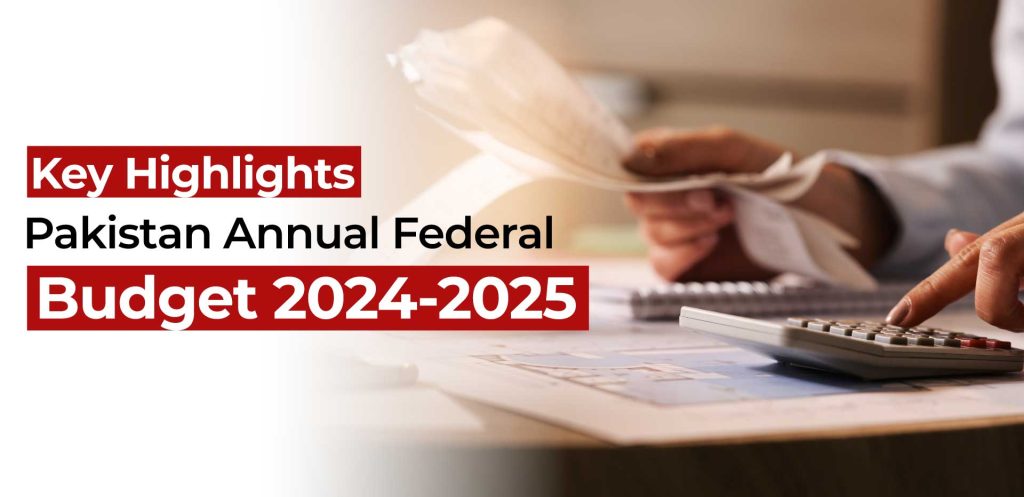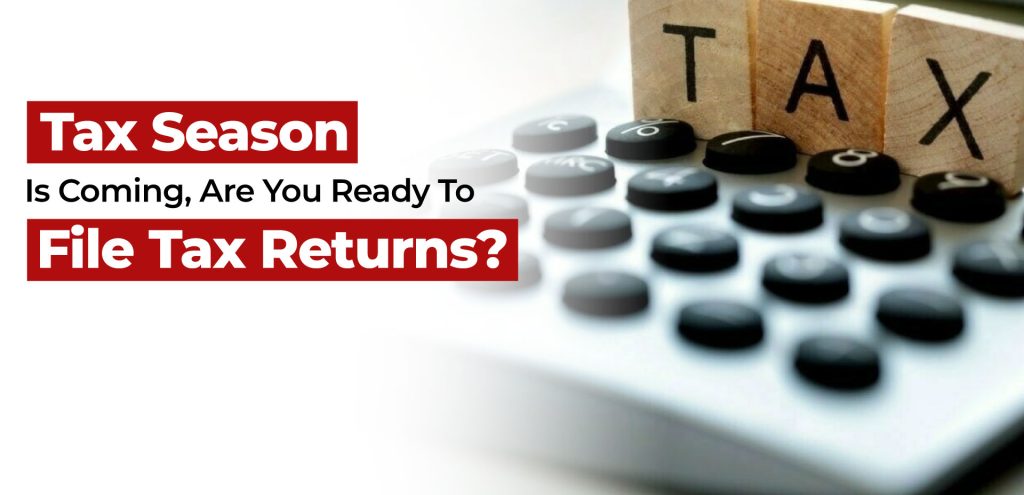
The much-anticipated annual federal budget for Pakistan’s fiscal year 2024-2025 was announced on June 12, 2024.
The latest budget introduces significant increases across various income and sales tax categories, with even more severe implications for non-filers and late filers.
In this article, we’ll delve into the key aspects of the budget. Our main focus will be on changes to income tax and sales tax, as these elements significantly influence the financial landscape.
Review the 2025 budget highlights for more information.
Income Tax Changes:
1. Personal Income Tax: The tax rates for non-salaried individuals and AOPs have been revised upwards from 35% to 45%.
2. Income Tax for Salaried Individuals: The tax rate remains at 35%. However, the incremental rates have been increased across different income slabs.
3. Advance Tax on Immovable Property Purchases: The rates have been adjusted as follows:
- Up to Rs. 50 million: 3% for filers, 12% for non-filers, and 6% for late filers.
- Between Rs. 50-100 million: 3.5% for filers, 16% for non-filers, and 7% for late filers.
- Over Rs. 100 million: 4% for filers, 20% for non-filers, and 8% for late filers.
4. Advance Tax on Immovable Property Sales: The rates have been adjusted as follows:
- Up to Rs. 50 million: 3% for filers, 10% for non-filers, and 6% for late filers.
- Between Rs. 50-100 million: 3.5% for filers, 10% for non-filers, and 7% for late filers.
- Over Rs. 100 million: 4% for filers, 10% for non-filers, and 8% for late filers.
5. Capital Gains on Properties: For properties acquired on or after July 1, 2024, the rates are 15% for filers and 15-45% for non-filers.
6. Capital Gains on Securities: For securities acquired on or after July 1, 2024, the tax
rate will be flat 15% for filers, and non-filers will be taxed at normal rates with a minimum of 15% and maximum of 45%.
7. Tax Rates on Dividend Income: For mutual funds earning 50% or more income from profit on debt, the tax rate on dividend has been increased from 15% to 25%.
8. Tax Rates on Capital Gains from Mutual Funds and REITs: The tax rate has been increased from 10% to 15%.
9. Profit on Debt: Non-Filers will now be paying tax at 35% on the interest income instead of 30%.
10. Super Tax: Super tax has been retained. However, high-income non-salaried individuals and AOPs face an effective rate of up to 55%.
11. Exporters: Exporters will be brought under the normal tax regime. However, 1% tax on export proceeds will be treated as a minimum tax (does not apply to IT exports).
12. Exemption Certificates: For withholding tax exemption certificates have been withdrawn, only reduced rate certificates will be issued in certain cases.
13. Penalties for Non-filers and Late Filers: Enhanced penalties have been introduced, including restrictions on foreign travel (except NICOP Holders, Minor & Students) and higher advance tax rates. Additional measures include blocking of mobile sim connections and discontinuation of utility connections.
14. Advance Tax on High-Value Assets: Increased rates for advance tax have been introduced on motor vehicles, property transactions, and other high-value assets.
Sales Tax Changes:
1. Withdrawal of Exemptions
- Edible Vegetables & Fruits from Afghanistan: Exemption on imports has been withdrawn.
- Medical & Diagnostics Kits/Equipment: Exemption on these imports and supplies has been removed.
- Supplies to Charitable Hospitals: Exemption on supplies to hospitals run by charitable institutions have been withdrawn.
- Imports by Non-Profit Institutions: Exemption on imports of goods by non-profit institutions have been withdrawn.
- Stationery Items: Exemption on specified stationery items (e.g., ball pens, erasers, exercise books) has been withdrawn and now taxed at 10%.
2. Introduction of New Exemptions
- Natural Disasters: Import of goods in case of natural disaster or other catastrophic events are exempted.
- Milk: Milk excluding that sold under a brand name is exempted.
- Iron & Steel Scrap: Exemption is introduced for iron and steel scrap.
3. Changes in Sales Tax Rates
- LPG: Sales tax rate on LPG has been increased from 10% to 18%.
- Hybrid Electric Vehicles: Locally manufactured hybrid electric vehicles will now be taxed at 18%.
- Petroleum Products: Zero-rating of petroleum products converted into exemption.
- Medicaments: Sales tax on medicaments classified under Chapter 30 of the Customs Act has been reintroduced at 18% from the existing 1%.
- Mobile Phones: Mobile phones will be taxed at the standard rate of 18%, with phones over $500 taxed at 25% irrespective of existing classification.
- POS Tier 1 Retailers: The reduced rate of 15% sales tax on finished articles of textile and leather supplied by Tier 1 Retailers through POS integrated outlets has been withdrawn. These will now be taxed at the standard rate of 18%.
- Personal Computers and Laptops: Sales tax rate on the import of personal computers and laptops have been increased from 5% to 10%.
4. Withholding Sales Tax
- Specified Goods: The registered person would be liable to withhold 80% of the sales tax applicable on purchase of lead batteries, gympsum, coal, waste paper, plastic waste, crush stone and silica from the person even registered with sales tax.
5. Administrative and Compliance Changes
- Minimum Prices for Third Schedule Goods: FBR can now set the minimum price for items listed in the Third Schedule.
- Sales Tax on Advance Payments: The definition of “time of supply” has been revised. The proposed changes imply that sales tax has to be paid on advance payments from customers, reinstating the condition that was removed vide Finance Act, 2021.
- Tax Fraud: The scope of tax fraud has been broadened, shifting the responsibility to the registered person who committed the fraud to prove that it was not intentional.
- Default Surcharge: The default surcharge is proposed to be calculated at SBP’s KIBOR rate plus 3%, replacing the existing straight rate of 12%.
This new budget has also highlighted the importance of tax filing for individuals, by introducing a new term ‘late filers’ in order to emphasize on the taxpayers to timely fulfill their tax obligations.
In order to facilitate “non-filers and late filers”, IKAE Consultants has developed an innovative online platform, The IKAE Consultants App and Web Portal, that empowers individuals to effortlessly become filers and effectively file their taxes with utmost convenience.
Recent Post
-
 How to Maintain Your Trademark Registration in Pakistan28 Jun 2024 News and Updates
How to Maintain Your Trademark Registration in Pakistan28 Jun 2024 News and Updates -
 Tax Season Is Coming, Are You Ready, Pakistani Tax Filers?28 Jun 2024 News and Updates
Tax Season Is Coming, Are You Ready, Pakistani Tax Filers?28 Jun 2024 News and Updates -
 Business Licenses and Permits in Pakistan – How to Obtain One?28 Jun 2024 News and Updates
Business Licenses and Permits in Pakistan – How to Obtain One?28 Jun 2024 News and Updates -
 Key Highlights from Federal Budget 2024-202511 Jul 2023 News and Updates
Key Highlights from Federal Budget 2024-202511 Jul 2023 News and Updates
